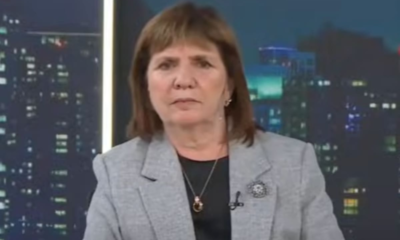INTERNACIONAL
Trump reverses course on Middle East tech policy, but will it be enough to counter China?

President Donald Trump secured $2 trillion worth of deals with Saudi Arabia, Qatar and the UAE during his trip to the Middle East last week in what some have argued is a move to counter China’s influence in the region.
While China has increasingly bolstered its commercial ties with top Middle Eastern nations who have remained steadfast in their refusal to pick sides amid growing geopolitical tension between Washington and Beijing, Trump may have taken steps to give the U.S. an edge over its chief competitor.
But concern has mounted after Trump reversed a Biden-era policy – which banned the sale of AI-capable chips to the UAE and Saudi Arabia – that highly coveted U.S. technologies could potentially fall into the hands of Chinese companies, and in extension, the Chinese Communist Party (CCP).
U.S. President Donald Trump walks with Saudi Crown Prince Mohammed Bin Salman during a welcoming ceremony in Riyadh, Saudi Arabia, May 13, 2025. (Bandar Algaloud/Courtesy of Saudi Royal Court/Handout via REUTERS )
TRUMP SIGNS ‘STRATEGIC ECONOMIC PARTNERSHIP’ WITH SAUDI ARABIA
China hawks on both sides of the aisle noted their concern after Trump entered into an agreement with the UAE to build the largest artificial intelligence hub outside the United States, coupled with the tens of billions of dollars’ worth of deals U.S. companies like Nvidia, ChatGPT, Google, Amazon and Qualcomm entered into with state-backed Saudi AI ventures, including direct chip sales.
«This deal could very well be dangerous because we have no clarity on how the Saudis and Emiratis will prevent the Chinese Communist Party, the Chinese government, the Chinese manufacturing establishment from getting their hands on these chips,» Senate Democratic leader Chuck Schumer said on the Senate floor last week.
«Inevitably, when foreign countries end up with American-made chips, the CCP, the Chinese Communist Party, sooner or later gets ahold of these American chips and their secrets in them,» he said. «That’s why we’ve had such strong restrictions against exporting these chips to other counties.»
Similarly, following the announced deals, Republican chair of the House Select Committee on the Chinese Communist Party, Rep. John Moolenaar, R-Mich., took to X to say, «The CCP is actively seeking indirect access to our top tech. Deals like this require scrutiny and verifiable guardrails.
«We raised concerns about G42 last year for this very reason—and we need safeguards in place before more agreements move forward,» he added in reference to an Emirati AI development holding company.
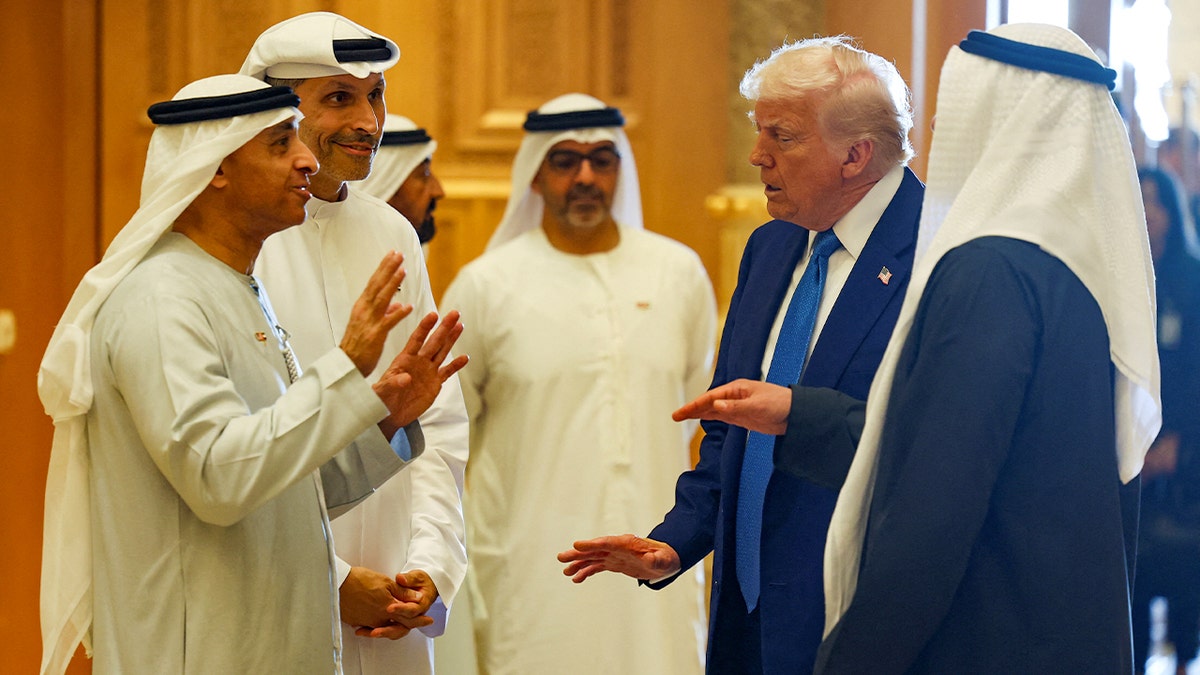
U.S. President Donald Trump attends a business forum at Qasr Al Watan during the final stop of his Gulf visit, in Abu Dhabi, United Arab Emirates, May 16, 2025. (REUTERS/Amr Alfiky)
TRUMP WRAPS MOMENTOUS MIDDLE EAST TRIP WITH ECONOMIC DEALS, SYRIA SANCTIONS RELIEF AND WARNING TO IRAN
By the end of Trump’s trip, the House Select Committee on the Chinese Communist Party had introduced new legislation «to stop advanced U.S. AI chips from falling into the hands of adversaries like the Chinese Communist Party (CCP).»
«The ambition is understandable – drawing the Gulf states deeper into the U.S. tech ecosystem is a logical way to counterbalance China’s growing influence,» Craig Singleton, China Program Senior Director and Senior Fellow with the Foundation for Defense of Democracies told Fox News Digital. «But the devil is in the details.
«Without rigorous safeguards and clear conditions on technology transfer, there’s a real risk of leakage — whether it’s advanced chips, know-how, or access to AI platforms,» he warned. «If these deals lack meaningful restrictions, they could end up strengthening the very actors they’re meant to contain.»
The Commerce Department did not immediately respond to Fox News Digital’s questions on AI security.
While questions remain about the future of AI security, some reports suggested that the expanded U.S. agreements could help cement the U.S. as the global leader in the emerging technology and help shape its landscape.
But China has interests outside of AI in the region that pertain to security, economic and energy sectors – all of which the U.S. has a vested interest in deterring.
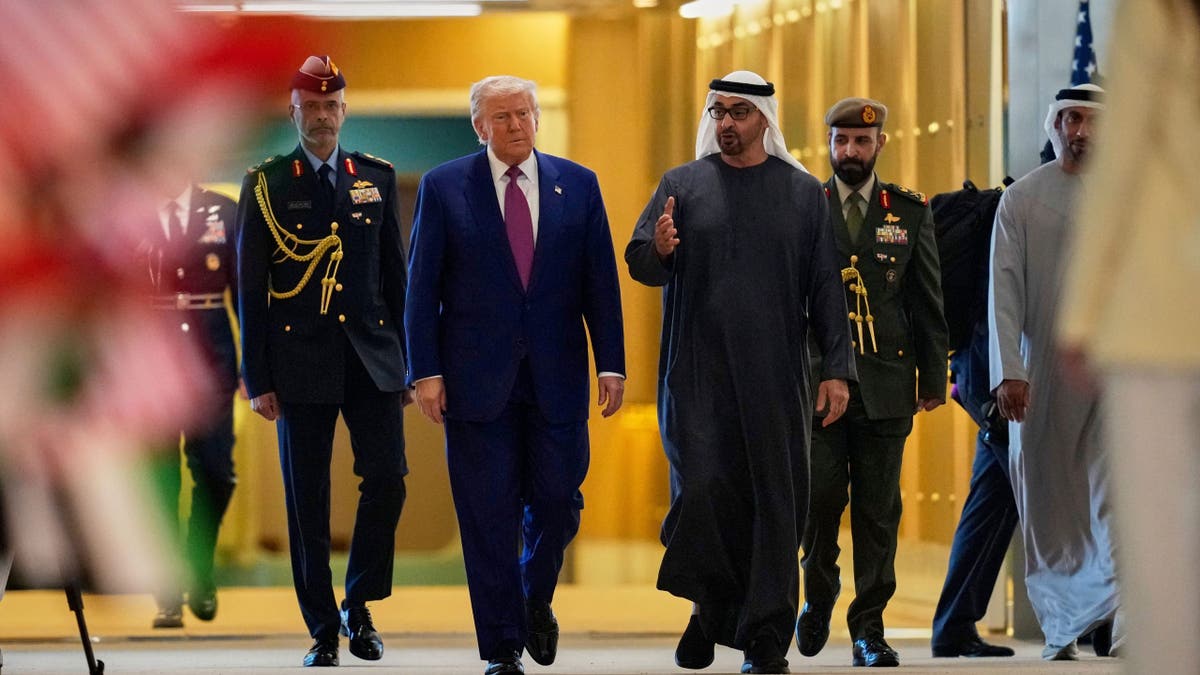
United Arab Emirates President Sheikh Mohammed bin Zayed Al Nahyan greets President Donald Trump at Abu Dhabi International Airport on Thursday, May 15, 2025. (AP Photo/Altaf Qadri)
Trump was the first president in nearly 20 years to visit the UAE, which security experts have told Fox News Digital will go a long way to further not only geopolitical goodwill amid major unrest stemming from the wars in Gaza and Ukraine, but it could even further bolster economic and security opportunities between Washington and Abu Dahbi.
«Trump showing up and re-committing American military and economic power to support the UAE’s stability, security, and success in a dangerous neighborhood can pay real dividends going forward,» John Hannah, former national security advisor to Dick Cheney and current Randi & Charles Wax senior fellow at the Jewish Institute for National Security of America (JINSA), told Fox News Digital.
«Since at least the time of President Obama’s nuclear deal with Iran, there’s been a slow, but noticeable drift in UAE strategy away from its deep reliance on the United States toward more of a hedging policy of playing all sides of the global great game, including an increasingly close relationship with China,» he added.
CLICK HERE TO GET THE FOX NEWS APP
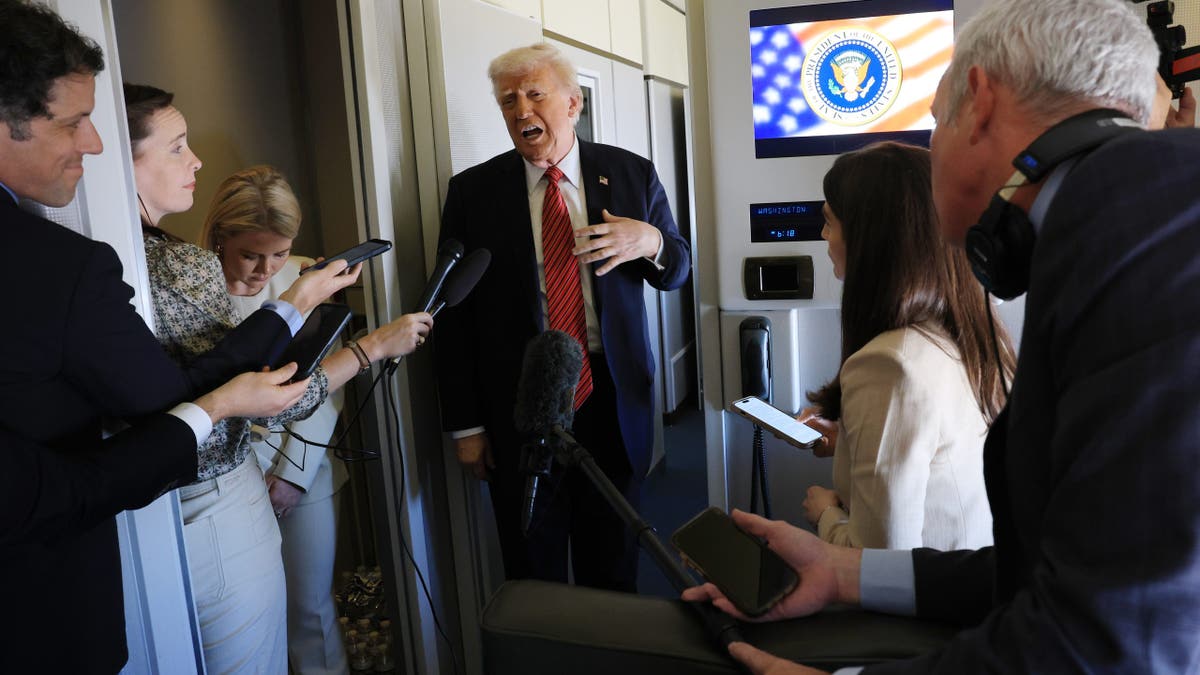
IN FLIGHT – MAY 14: U.S. President Donald J. Trump speaks to travelling media aboard Air Force One on a range of issues, including Syria, as he flies to Doha, Qatar on May 14, 2025. Trump is on the second day of a multi-nation tour of the Gulf region focused on expanding economic ties and reinforcing security cooperation with key U.S. allies. (Photo by Win McNamee/Getty Images)
Hannah explained that a period of American weariness of the Middle East enabled China to effectively expand its geopolitical interests in the vital region.
The expert pointed out that not only does the UAE host U.S. troops on its soil, but its trade value with the U.S. – even prior to the $1.4 trillion deal it reached earlier this year – was worth some $35 billion annually.
«With a country as influential and resource-rich as the UAE, correcting that unhelpful perception and putting the strategic relationship back on a much more positive dynamic is an important goal,» Hannah said.
Fox News Digital could not immediately reach the UAE foreign ministry for comment.
INTERNACIONAL
Tensión en el sudeste asiático: Tailandia bombardea Camboya, en una disputa que deja una decena de muertos

El ejército tailandés bombardeó este jueves objetivos militares en Camboya y reportó la muerte de al menos 12 personas en su territorio por disparos del país vecino, en los peores enfrentamientos en 15 años entre estos dos reinos del sudeste asiático.
Los dos países mantienen desde hace décadas una disputa territorial en el Triángulo de Esmeralda, una zona donde confluyen sus fronteras y la de Laos y donde se conservan varios templos antiguos.
En mayo estallaron enfrentamientos armados en los que murió un soldado camboyano. Desde entonces, los dos bandos intercambiaron críticas, provocaciones y represalias, como la restricción de los cruces fronterizos o las importaciones.
Las hostilidades se desataron nuevamente el jueves. Camboya disparó cohetes y proyectiles de artillería sobre Tailandia, que desplegó de su lado seis aviones de combate para bombardear dos objetivos militares en el país vecino.
El Ministerio de Salud tailandés señaló que los ataques camboyanos habían matado a 12 personas, un soldado y 11 civiles. La mayoría de las víctimas murieron cerca de una estación de servicio en la provincia de Sisaket, dos en la provincia de Surin y una en Ubon Ratchathani, todas en el noreste.
Imágenes publicadas en las redes sociales muestran un minimercado consumido por las llamas.
Responsables provinciales informaron que la mayoría de las víctimas son estudiantes, mientras que un niño de ocho años falleció en Surin.
China, que suele mantener buenas relaciones con ambos países, expresó el jueves estar «profundamente preocupada» por estos choques e invitó a las dos partes a «resolver el problema de forma adecuada mediante el diálogo y la consultación», dijo su portavoz diplomático Guo Jiakun.
La Unión Europea hizo un llamado a la desescalada y pidió a ambas partes a que «resuelvan las disputas a través del diálogo y otros medios pacíficos, en línea con el derecho internacional».
En tanto, el primer ministro malasio y actual presidente temporal de la Asociación de Naciones del Sudeste Asiático (ASEAN), Anwar Ibrahim, pidió a ambos países a «moderación» y manifestó su deseo de que se inicien negociaciones.
Bangkok y Phnom Penh reanudaron las hostilidades tras la muerte de un soldado jémer a fines de mayo, en medio de un tiroteo en la zona fronteriza disputada.
Diferentes medidas de represalia, decretadas por ambos bandos pese a los llamados a la calma, ya han afectado a la economía y el destino de numerosos habitantes en las regiones involucradas.
Por su parte, el Ministerio de Relaciones Exteriores de Camboya denunció este jueves la «agresión militar» tailandesa.
Ambas naciones se acusaron mutuamente de abrir fuego primero el jueves por la mañana en las cercanías de dos templos disputados en la frontera entre la provincia tailandesa de Surin y la camboyana de Oddar Meanchey.
El primer ministro interino de Tailandia, Phumtham Wechayachai, afirmó que la situación precisa de «una gestión cuidadosa» y «dentro del derecho internacional». «Haremos lo mejor para proteger nuestra soberanía», dijo.
La embajada de Tailandia urgió a sus nacionales a salir de Camboya «lo antes posible», a menos que tengan razones urgentes para permanecer. China también instó a sus ciudadanos a salir de ese país.
El primer ministro de Camboya, Hun Manet, pidió una reunión de «urgencia» del Consejo de Seguridad de la ONU ante los ataques «no provocados, premeditados y deliberados» de Tailandia.
El enfrentamiento se dio un día después de que Tailandia expulsara al embajador camboyano y llamara de vuelta a su enviado en Phnom Penh, en respuesta al estallido de una mina terrestre que hirió a un soldado tailandés.
El primer ministro tailandés afirmó que una investigación del ejército de su país encontró evidencia de que Camboya había colocado minas terrestres en la zona disputada, algo que Phnom Penh niega.
Camboya rechazó estas acusaciones y aseguró que en las zonas fronterizas están todavía infestadas de minas activas de «guerras del pasado».
El jueves por la mañana, Phnom Phen degradó las relaciones con su vecino «al nivel más bajo», retirando a todos sus diplomáticos en Bangkok excepto uno y expulsando a sus equivalentes tailandeses en su territorio.
Estas son las hostilidades más graves en la frontera de ambos reinos desde unos enfrentamientos alrededor del templo Preah Vihear que dejaron al menos 28 muertos y decenas de miles de desplazados entre 2008 y 2011.
Tailandia,Camboya
INTERNACIONAL
Fox News Politics Newsletter: A Big, Beautiful Clawback
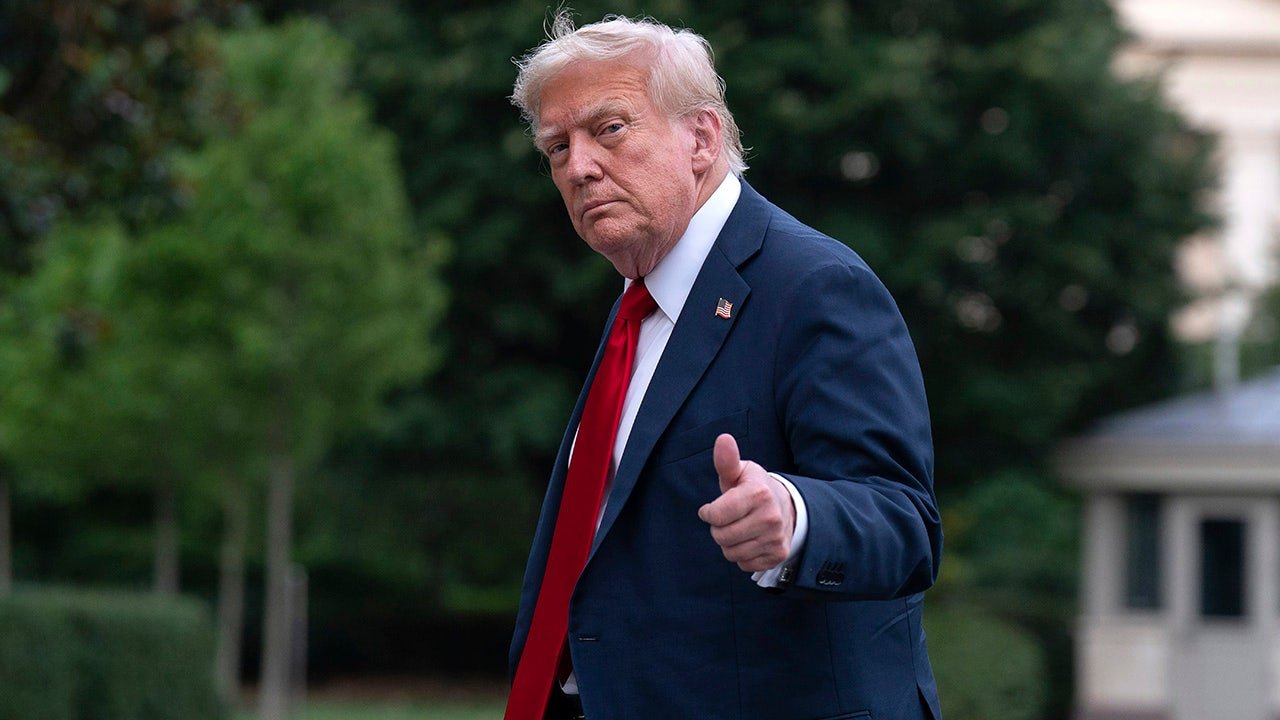
NEWYou can now listen to Fox News articles!
Welcome to the Fox News Politics newsletter, with the latest updates on the Trump administration, Capitol Hill and more Fox News politics content. Here’s what’s happening…
– Trump admin readies for fight after judges block Abrego Garcia removal for now
– Thailand, Cambodia troops open fire on each other, killing at least 12
– Senate Republicans call on DOJ to appoint special counsel to probe Obama-Russia intel
Trump Privately Signs $9 Billion Clawback Package of Spending Cuts
President Donald Trump signed into law his roughly $9 billion rescissions package to scale back already approved federal funds for foreign aid and public broadcasting Thursday, after both chambers of Congress approved the legislation earlier in the month, sources familiar to the matter have confirmed.
The signing marks another legislative victory for the Trump administration just two weeks after the president signed into law his massive tax and domestic policy measure, dubbed the «big, beautiful bill.»
The rescissions package pulls back nearly $8 billion in funding Congress already approved for the U.S. Agency for International Development (USAID), a previously independent agency that provided impoverished countries aid and offered development assistance… READ MORE
President Donald Trump gives a thumbs up to reporters as he walks on the South Lawn upon arriving at the White House on Sunday, July 13, 2025, in Washington, D.C. (AP/Jose Luis Magana)
White House
‘LAWLESS AND INSANE’: Trump admin readies for fight after judges block Abrego Garcia removal for now
CLASH OVER AUTHORITY: Trump foe Boasberg to grill DOJ over migrant flights in heated hearing
REVERSING COURSE: Trump says he wants Elon Musk to ‘thrive’ after suggesting DOGE could investigate him
POWER STRUGGLE: Trump stands by Alina Habba as DOJ clashes with judges over her replacement
LEGAL SCRUTINY: DOJ forms Russiagate ‘strike force’ to investigate declassified Obama-era evidence
LEGAL SETBACK: Federal appeals court rules against Trump’s birthright citizenship executive order
‘I AM RECOVERING’: Pam Bondi cancels appearance at anti-trafficking summit over medical issue
World Stage
ACCOUNTABILITY TEST: Zelenskyy forced to rethink anti-corruption law after public backlash
MAN MACHINE MERGER: China experimenting with brain-computer interfaces in global race for AI dominance: report
BORDER BATTLE ERUPTS: Thailand, Cambodia troops open fire on each other, killing at least 12
BEACH BLAST: Battle over the Black Sea: Russia, Ukraine strike top resort cities
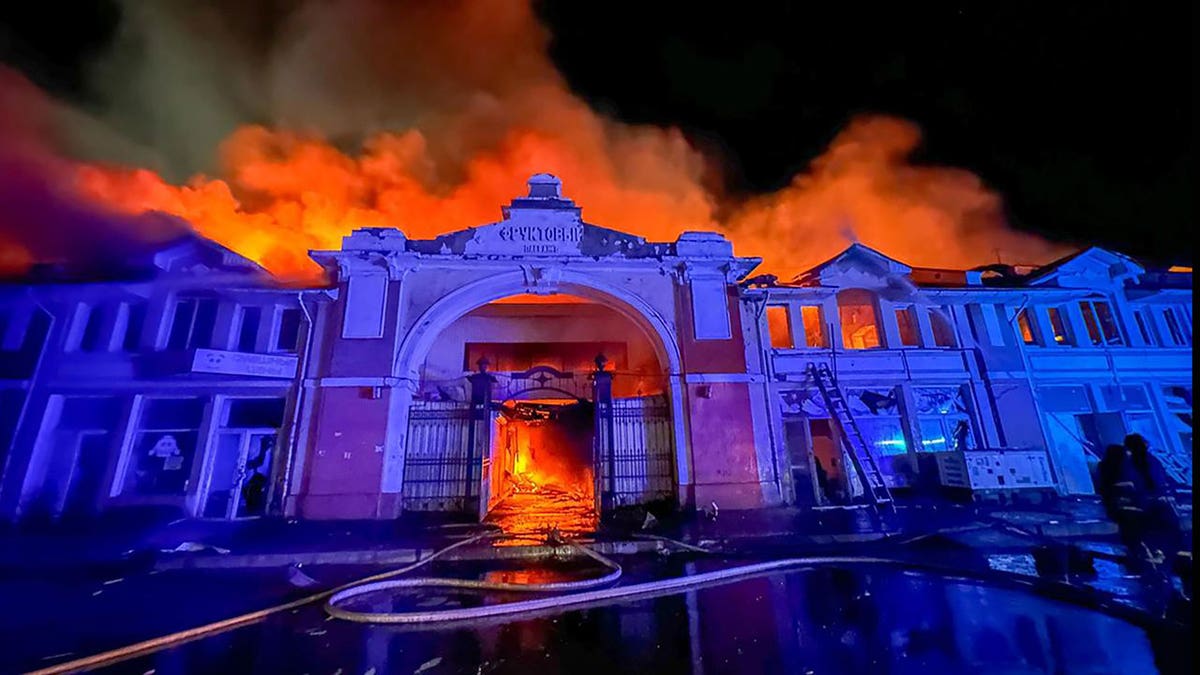
Russia launched a terrifying assault on Ukrainian Black Sea city Odesa, hitting a nine-floor residential building and destroying the iconic Privoz Market, which has existed since 1827, Odessa, Ukraine 7/24/25. (East2West via Ukraine Ministry of Defense)
Capitol Hill
EYES IN THE SKIES: Rules keeping drones on leash could loosen with deregulation proposal from Congress
COLLUSION CHAOS: Trump-foe Adam Schiff dismisses Tulsi Gabbard’s declassified Russia collusion intelligence as ‘dishonest’
BEG YOUR PARDON: WATCH: House Republicans zero in on Biden autopen pardons after bombshell report
EPSTEIN SECRETS: Jeffrey Epstein accomplice Ghislaine Maxwell to see how feds meeting plays out amid subpoena: brother
CREATING OPPORTUNITY: EXCLUSIVE: GOP proposal seeks to end ‘backdoor hiring practices’ at American universities
INTEL DECEPTION: Senate Republicans call on DOJ to appoint special counsel to probe Obama-Russia intel
BRIDGING THE DIVIDE: ‘Shirts and Skins’: How one Republican bridged the gap to pass Trump’s ‘big, beautiful bill’
NOT WELCOME: House Republican introduces companion bill to end China’s buying of American farmland
‘GOOD LUCK’: House to vote on censuring Dem rep charged in ICE facility incident
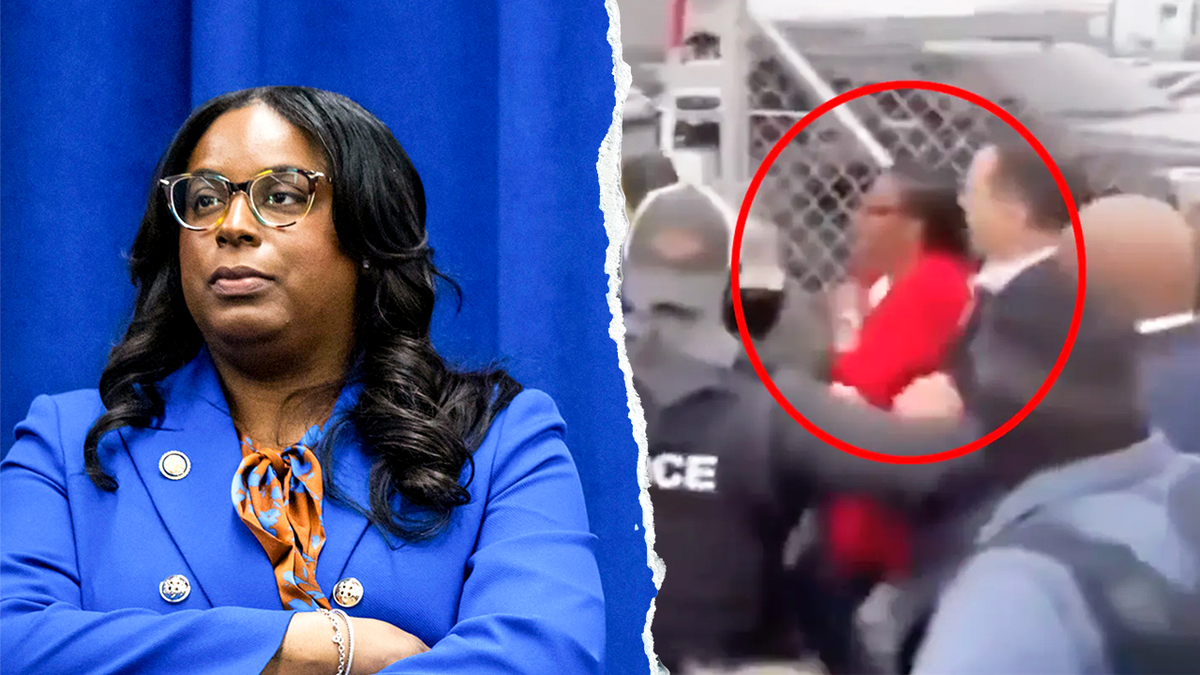
New Jersey Rep. LaMonica McIver was charged on Monday for allegedly assaulting law enforcement officers outside of an ICE detention facility earlier this month. (Getty Images/Department of Homeland Security)
KLAIN TO FAME: Ex-Biden chief of staff Ron Klain faces grilling in House GOP’s cover-up probe
ANTI-ANTISEMITISM: Pro-Israel Dem says those who won’t decry Hamas over Oct. 7 attack ‘have no business’ posing as humanitarians
FINDING THE FORCE: ‘Star Wars bar of leftists’: Weingarten, Hunter, Mamdani prove Democrat Party lead by extreme figures
Across America
‘SEVER’ CONNECTIONS: West Point Bible crest controversy spurs lawsuit from conservative watchdog
THE CHOSEN ONE: RNC Chair Michael Whatley to seek open Republican-held Senate seat in battleground North Carolina: sources
HATE SPEECH SILENCE: Dem governor criticizes Mamdani for not condemning ‘blatantly antisemitic’ rhetoric
WAKE UP CALL: Mamdani’s former Dem colleague rails against his signature campaign promise: ‘Nail in the coffin’
Get the latest updates on the Trump administration and Congress, exclusive interviews and more on FoxNews.com.
INTERNACIONAL
Estados Unidos ofrece una recompensa millonaria por siete norcoreanos acusados de financiar al régimen de Kim Jong-un

El Departamento de Estado de Estados Unidos ofreció este jueves una recompensa de hasta quince millones de dólares por información que lleve al arresto o condena del norcoreano Sim Hyon-sop y de seis presuntos colaboradores, vinculados a actividades ilícitas para obtener divisas destinadas al régimen de Kim Jong-un, entre las cuales se destacan operaciones de contrabando y la compraventa ilegal de tabaco, con el objetivo de acceder a dólares estadounidenses y financiar entidades sancionadas por la ONU y Washington.
La recompensa se distribuye en diferentes montos: hasta siete millones de dólares por Sim Hyon-sop, hasta tres millones respectivamente por Myong Chol-Min y Kim Se-Un, y hasta 500.000 dólares por Ri Won-Ho, Kim Yong-Bok, Kim Chol-Min (alias “Jack”) y Ri Tong-Min (alias “Elvis”). El Departamento de Estado sostiene que los siete norcoreanos organizaban la compraventa internacional de tabaco de origen norcoreano, facilitando el ingreso de divisas al país asiático en violación de las sanciones vigentes.
El comunicado estadounidense detalla además que a Sim, junto a varios de sus colaboradores, se les atribuyen operaciones ilícitas relacionadas con el sector de las tecnologías de la información (TI). Según la información oficial, el régimen de Pyongyang envía a miles de trabajadores de TI al extranjero, en particular a Rusia y China, para gestionar proyectos y trabajos fraudulentos. Estas actividades incluyen operaciones de ciberdelincuencia, diseñadas para generar ingresos que contribuyen a la financiación de los programas de armas de destrucción masiva del régimen norcoreano.
En paralelo, el Departamento del Tesoro de Estados Unidos anunció sanciones contra la compañía Korea Sobaeksu Trading Company, señalando su rol como entidad reclutadora y coordinadora de trabajadores norcoreanos especializados en TI en el exterior, entre ellos envíos recientes a Vietnam. Las sanciones también afectan a tres ciudadanos norcoreanos implicados en planes ilegales destinados a la obtención de fondos para el régimen.
Según la administración estadounidense, estas redes operadas desde el extranjero otorgan a Corea del Norte acceso a sistemas tecnológicos avanzados, infraestructura financiera ilícita y facilitadores internacionales que apoyan la recaudación de fondos para organizaciones sancionadas, como el Departamento de Industria de Municiones y el Ministerio de Energía Atómica e Industria. Dichas instituciones cumplen un papel central en el desarrollo del programa nuclear y de misiles, foco de condena internacional.
El Departamento de Estado enfatizó que las medidas tomadas reflejan la determinación de la Administración de Donald Trump para enfrentar las amenazas de Corea del Norte y proteger tanto los intereses de las empresas estadounidenses como la estabilidad del sistema financiero y la seguridad de los ciudadanos.

Por otra parte, la situación de seguridad regional en Asia ha mostrado nuevas señales de tensión tras declaraciones del dictador norcoreano Kim Jong-un para arengar a su ejército a prepararse “para una guerra real”, durante un concurso de disparo de unidades de artillería efectuado el miércoles y difundido este jueves por los canales estatales de comunicación. Según la Agencia Central de Noticias de Corea (KCNA), Kim instó a las tropas a estar listas para el combate “en cualquier momento” y a desarrollar la capacidad de “destruir al enemigo en cada batalla”.
Las imágenes, difundidas por la Televisión Central de Corea, muestran a Kim observando las maniobras con binoculares desde un puesto de mando, acompañado de altos mandos militares. La localización del ejercicio no fue divulgada.
Estos llamados a la preparación militar se producen después del reporte de agencias de inteligencia surcoreanas y occidentales sobre el envío de más de 10.000 soldados norcoreanos a la región rusa de Kursk, junto a material bélico como proyectiles de artillería, misiles y sistemas de cohetes de largo alcance, en apoyo a la ofensiva rusa en Ucrania que lleva ya más de tres años desde su inicio. En esos enfrentamientos, murieron aproximadamente 600 soldados norcoreanos y miles resultaron heridos, según fuentes oficiales surcoreanas.
Las relaciones entre Corea del Norte y Rusia han cobrado renovado impulso a partir de la firma de un acuerdo militar el año pasado, que contempla una cláusula de defensa mutua. El pacto fue sellado durante la visita del presidente ruso Vladimir Putin a Pyongyang. Kim Jong-un reiteró su respaldo total a Rusia en su conflicto con Ucrania durante una reunión con el canciller ruso, Sergei Lavrov, el pasado 13 de julio en la ciudad de Wonsan, en el este del país.
Ambos gobiernos permanecen bajo fuertes sanciones internacionales y su cooperación militar suscita preocupación en la comunidad internacional por el potencial impacto en la seguridad regional y global.
(Con información de AFP y EFE)
Asia / Pacific,Government / Politics,PYONGYANG

 ECONOMIA2 días ago
ECONOMIA2 días agoEl consumo en Argentina crece 4% en junio, ante menor inflación y más crédito

 POLITICA1 día ago
POLITICA1 día agoMáximo Kirchner declaró una fortuna de 8.300 millones de pesos: representa un 76% más que el año anterior

 CHIMENTOS2 días ago
CHIMENTOS2 días agoEl desgarrador testimonio del hermano de Locomotora Oliveras: “El daño es irreversible, solo puede vivir con respirador”















